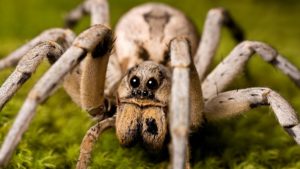Part of the What Do You Know About That series
by Ruth Orr
YOUR HOUSE — You know how sometimes you’re plugging along, minding your own business, when suddenly you just know that something’s not right? Call it a gut feeling, a sixth sense, a warning from on high, but it causes you to stop and freeze in the moment. Sometimes there’s literally nothing wrong and you can go about your day feeling a bit silly. But sometimes, sometimes that gut feeling saves lives. Or at least some weird, wacky, painful, or other unpleasant situations. What’s up with that?
 I find myself thinking about the topic as the spiders begin their annual migration from whatever hell they overwintered in and now jockey for prime positions in my bathroom cupboards. Full disclosure, I actually like spiders, and as long as they obey the house rules they can stay, but so often they’re bad roommates and seem determined to ruin my day by dropping in while I’m alone and vulnerable on the porcelain throne. Not cool, guys.
I find myself thinking about the topic as the spiders begin their annual migration from whatever hell they overwintered in and now jockey for prime positions in my bathroom cupboards. Full disclosure, I actually like spiders, and as long as they obey the house rules they can stay, but so often they’re bad roommates and seem determined to ruin my day by dropping in while I’m alone and vulnerable on the porcelain throne. Not cool, guys.
Anyway, the point is that I recently was cleaning, as I try to do before company comes over so nobody sees how I really live, and was about to reach my hand into a decorative pot that holds my miscellaneous fancy soaps and bath bombs. And suddenly I had a visceral, gut-punch pull that made me freeze. I tilted the pot towards me to look in, and low and behold, a very large wolf spider was blinking back at me. Probably wouldn’t have killed me directly, but I might’ve had a heart attack if I grabbed onto it. There wasn’t anything really amiss in my bathroom, it was a bright afternoon with sunlight coming in through the window, and no ominous background music was playing. I’ve reached into the pot dozens of times in the last few months. So why did I suddenly freeze?
Honestly I don’t know for sure, I’m not a brain scientist. But I do know that there are brain science people out there, and they have found over and over and over again that our gut feelings are a lot more credible than we might think.
The word researchers often use is ‘intuition’, rather than ‘a hunch’, because it looks more professional in their papers. But researchers have found that by pairing intuition with an ability to think analytically, we can make better, faster, and more accurate decisions than we can make when relying on facts and thinking alone. That’s especially true when there’s no clear-cut ‘correct’ option.
Scientists also sometimes refer to the stomach as ‘the second brain’, because you actually have a neural network of over 100 million neurons lining the entire digestive tract. That’s more than are in your spinal cord! Anyway, if you allow your gut to help out when you’re thinking, it works in tandem with your brain to assess all your memories, past learnings, personal needs and preferences, and then makes decisions based on that. Which is wild, but doesn’t exactly answer why I abruptly knew that there was something wrong with my soap before I’d actually seen anything amiss.
Well, here’s my hypothesis: I did see something amiss. I just didn’t see it consciously.
Today most of us, at least in our part of the world, live in nice, swanky houses with walls and floors and roofs that keep the worst of the natural world from falling in on us while we sleep. But for a very, very long time, that was not the case. Our little hominid ancestors had to make do in the tall grasses and shrubs of the African Savannah. Every generation that has come before us has faced spiders and snakes and nasty diseases. And the ones who had the best chance of surviving and going on to make your many-time great-great-grandparents were the ones who could recognize the dangers before they got hurt. The result is a body that has been programmed over millennia to avoid bad stuff.
I know I probably sound kinda kooky, but if you take a step back and look at it, things make sense. Say you open your fridge in the morning and grab out the jug of milk to go on your cereal. You unscrew the cap and a stench permeates the kitchen— spoiled milk— I’m betting your first instinct is to gag, quickly followed by getting the milk away. It’s certainly not to pour it in the bowl and eat through the pain. Why? Because your body is yelling at you that drinking spoiled milk could be dangerous. You don’t ever have to have chugged rotten milk and then been sick for a week before to know instinctually that it would be bad. Same goes for other rotting foods— your desire to not consume it stems from a gut-level reaction to it being icky. Of course, there are weirdos out there who intentionally eat moldy stuff (looking at you, blue cheese) but by and large, that holds true.
It’s hard to prove empirically, but there are other hypotheses out there about things we know and recognize on a gut level are dangerous. If you’re walking in the forest and suddenly feel uneasy, you might notice it’s due to a lack of bird song or other generic forest noises. You’ll probably feel like something is wrong before you consciously recognize the quiet. It could be a large predator in the area, and you won’t ever even see it, but your gut and brain are telling you to be on your guard.
I personally like the snake detection hypothesis, which suggests that snakes were so problematic to our primate ancestors that our eyes got hardwired into detecting snakes. As humans, our eyesight is our most developed sensory system. We can see way more than we can hear or smell or even taste. And we’re uncannily good at picking out camouflaged things in the landscape, ie snakes. Studies have found that primates, including humans, are able to detect snake images in a picture based on gut, before the picture has fully rendered enough to actually really see a snake. When shown a number of fear-inducing images, studies have found primates (again including us) detect snakes faster than anything else, including spiders. An instinctive understanding that snakes are no bueno would also help explain why ophidiophobia (fear of snakes) is one of the most common and intense phobias in the world. It’s not proven, and there are plenty of arguments about it, but it’s definitely something to think about.
There’s a similar hypothesis about spiders. While not as inherently spooky as snakes, venomous spider bites could absolutely take down a little hominid just looking for a snack under that fallen log. Thus, learning to not blindly grab into places that might be spider homes became a crucial survival instinct. That’s what I think happened to me when I reached for soap— the lid I usually kept tight on it was slightly ajar, and some ancient ancestor didn’t almost die from a black widow bite for my gut to just ignore the fact that a spider could’ve gotten into that nice, protected, dark little hole. Don’t worry, my bath buddy was evicted to the garden, not smushed.
On a side note, similar studies to the snake one have been performed on images of spiders— when shown blurry or close-up or far-away pictures of things that often induce fear, including spiders, needles, and flies (did you know that’s a fear? I did not), spiders were recognized much faster than any other image. One study took participants and showed them an image on a screen for an eighth of a second of a cross shape. They were told they were supposed to be trying to absorb in that time frame which arm of the cross was longer. But after a few flashes, a second image was flashed at the same time as the cross— a hypodermic needle, a fly, a spider, or abstract shapes made by rearranging the lines of the spider. Participants were then asked if they saw the second image, and then asked to identify it. The results were that people saw and recognized the spider much more than the other images.
It’s not just us who’ve been affected, by the way. There is a hypothesis that we were so bad for snakes that several groups of them evolved to defend against us too— namely spitting cobras, which have evolved in three different groups. Most venomous snakes use their bite to hunt, with defense as a last resort. But spitting cobras have venom that seems to be designed for defense first, causing pain more than paralysis. They also shoot their venom from a distance, and upwards— which would make sense if they were trying to incapacitate a bipedal humanoid threat approaching it, but not much sense when dealing with other snakes or quadruped predators. It could still be disproven as a hypothesis, but at the moment, it makes sense.
Anyway, the moral is you should listen to your gut (though in tandem with your head brain, don’t just stop actively thinking things through) and always check holes for spiders before you put your hand in them.




